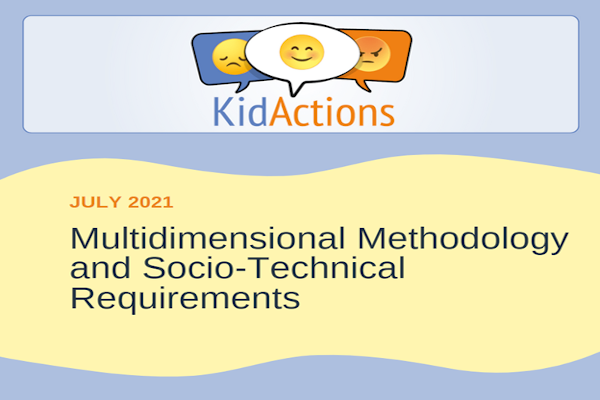Author: Rita Marques, Youth for Exchange and Understanding (YEU)
The Multidimensional Methodology and Socio-Technical Requirements document, developed during July, has been published on the KID_ACTIONS website. This document provides guidelines and approaches on how to engage all stakeholders and target groups in the daily use of the KID_ACTIONS Digital Education Platform and the co-creation of a targeted training and educational path.
For the development of the Multidimensional Methodology and Socio-Technical Requirements, we took into consideration desk research on the topic of cyberbullying and common practices for preventing and responding to this phenomenon, as well as the information provided by key experts, policymakers, teachers, youth workers, and young people, via the focus groups, semi-structured interviews and online survey conducted within the KID_ACTIONS Project. The consulted stakeholders provided insights on what they consider relevant in terms of mechanisms to prevent and respond to cyberbullying, as well as their expectations for the KID_ACTIONS Digital Education Platform.
Firstly, the research has shown that multidisciplinary and comprehensive approaches are the most effective in fighting cyberbullying, as well as the most sustainable in the long term. Thus, the creation of effective and efficient strategies implies the involvement of all members of society, including policymakers, parents, teachers, youth workers, children, and young people, bystanders, traditional media, social media companies and ICT companies in general. Moreover, it is essential that young people learn to cope with their emotions, that they learn to be more empathetic, accept other people and their differences, and build resilience, as these are essential to combat cyberbullying. Therefore, the KID_ACTIONS Multidimensional Methodology and Socio-Technical Requirements document highlights the importance of:
- creating/updating curricula for teachers focused on strengthening emotional, psychological, and social skills of youngsters;
- the creation of a set of training activities on cyberbullying for youth workers, ensuring a holistic approach towards the overall empowerment of young people;
- empowering parents to guide and support children and young people;
- supporting young people in developing empathy towards others via training, non-formal learning opportunities, or simulations.
Regarding the development of the KID_ACTIONS Digital Education Platform, it is necessary to consider co-creation as an overarching principle and essential to assure the success of the platform. Thus, digital tools should be co-designed with young people, keeping their interests, expectations and needs in mind, but also taking into consideration the context of use and the infrastructure available. It is also necessary to train teachers, parents, educators, youth workers on how to utilize the tools and ensure their applicability to their daily work with children and young people. Lastly, teachers, youth workers, and young people agreed that combining online tools with offline group work is the most effective and preferred method to combat cyberbullying.
These are some of the key findings and recommendations coming out of the KID_ACTIONS Multidimensional Methodology and Socio-Technical Requirements, that will be the methodological base for the project and will guarantee that its outcomes are relevant and effective in preventing and responding to cyberbullying among children and young people.
KID_ACTIONS_Public report_Multidimensional methodology and socio-technical requirements_v.1

